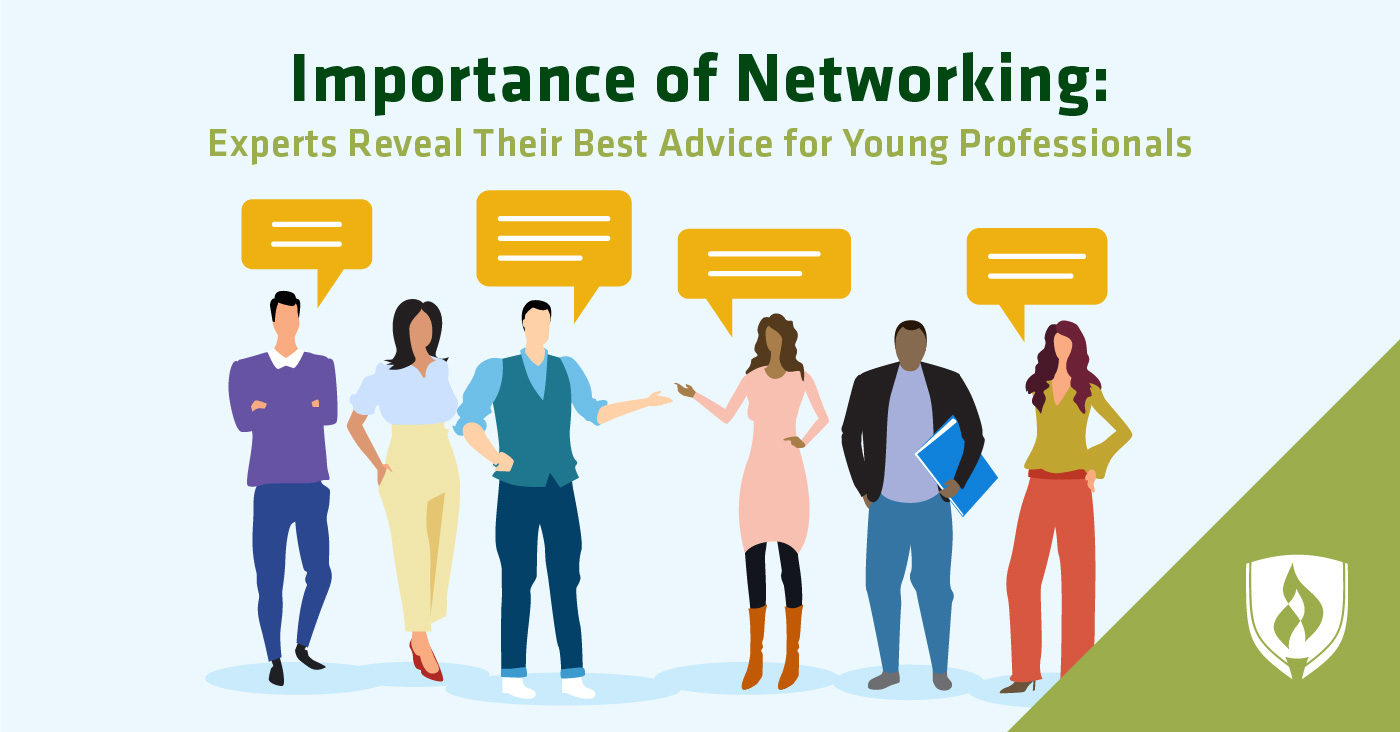Importance of Networking: Experts Reveal Their Best Advice for Young Professionals
By Hannah Meinke on 02/17/2020
You’ve probably heard “It’s not what you know, but who you know.” It might be a tired phrase, but considering that a huge portion of job openings are not even listed and are instead filled via personal networks, it's tired for a reason.

Networking can sometimes feel like a lot of work for little payoff if you’re just getting started in a career. You give your free time to talk to people you’ve never met about a career that hasn’t really started—not exactly an easy thing to get fired up for. But equipped with the right mindset, skills and opportunities, it doesn’t have to be that way.
We asked dozens of professionals and career experts why someone like you should consider investing their time and energy in networking, and to share their best advice for making the most of their networking experiences.
The widespread impact of networking
We know that what you really want is a job, and a network can certainly help with that. But a career is more than one job in one stage of your life. Explore the other ways networking can help you develop professionally and personally.
It can help make up for a lack of work experience
There’s nothing worse than finding what seems to be the perfect job only to see that discouraging bullet point: 3-5 years’ experience required. When you’re just starting your career, it can be hard to convince employers that an untested candidate is qualified. But meeting those employers face-to-face can help ease some of their concerns.
“We are living in a world where relationships are valued over credentials,” says Kimberly Ihekwoaba, founder of Kihek Creations. This is not to say that credentials are unimportant, but they’re certainly not the sum of your value. When people are evaluating whether they want to work with you, a strong connection can speak volumes over even the scarcest resume.
Trenton Erker, director of SEO at Clarity Online SEO, puts it this way: “When people of influence see only your resume, they judge you by that alone. When people of influence meet you in person, they see more than a resume and may disregard some of your shortcomings because they like you.”
It’s an opportunity to develop your people skills
It’s hard enough to talk to people you don’t know, and it can seem even more intimidating when you’re trying to convince them that you’re professional, employable and personable. This is what keeps many from even trying. But it’s important to remember that even an absolutely awkward mess of an interaction can be a positive learning experience. As a kid you didn’t just hop on a bike and pedal off into the sunset—you likely took a few tumbles until you got the hang of it. Make a note of what went wrong, adjust your approach and keep at it. These attempts at networking can be great way to build your confidence around others—a skill you’ll rely on your entire career.
David LaVine, marketing consultant and founder of RocLogic Marketing, offers this advice: "Don't be afraid to share who you are. You're good at some things and bad at others. So is everyone else." He argues that the best you can do is be authentic. Remember that the stakes are typically pretty low—if an awkward pause here and there is the worst that happens, you’ll be ok!
Create a lifelong support system
Even if all you want from networking is a job, you’ll benefit from staying connected with other professionals. HR consultant and motivational speaker Heidi Kurter points out that even if you’re comfortable for now, you won't have the same job forever. “Get your name out there and keep it out there even after you've landed your dream job because, eventually, you'll outgrow that job and need to lean on your network again to find another opportunity.”
So, keep reaching out and stay plugged in. You’ll be more prepared for a change while keeping a pulse on your industry at the same time.
Make friends and find a role model
If you’re connecting with likeminded people, you’re bound to find someone you get along with. In fact, Luke Marchie, founder of Franklin Digital, argues that looking for those close connections right away is the best way to network. “I know that after meeting 10-15 new people in a night the ones that stand out in my mind are the individuals I could imagine myself being friends with outside of my business world. I don't endlessly pitch my friends my business offerings, and I find if you take that same approach to networking, you'll have plenty of time to do it later once you forge that initial relationship.”
In other words, making friends first and pitching yourself later is much easier than swapping business cards with everyone you meet. At the very least, you may find someone to look up to in your career. “Networking can be a unique opportunity for recent grads to connect with future mentors or learn about roles or industries they hadn't thought to explore before. This exposure to new ideas, others ' lived experiences and great advice can be exceedingly helpful in navigating the first years of your career,” says Randi Braun, founder of Something Major.
Networking advice from the experts
It's always helpful to learn from those who were once in your shoes. Consider this expert insight from seasoned pros who have seen the impact of networking firsthand.
Give before you take
Have you ever felt like networking is just a fancy word for everyone trying to get something from everyone else? This is one of the reasons it can feel awkward or a little inauthentic. It can also leave you with little to say when your game plan has one play: get a job. You may be relieved to hear this isn’t even the most effective way to network.
Dawson Whitfield, co-founder and CEO of Looka, recommends highlighting what you bring to the table first.
“Good networking—the kind that builds genuine connections and grows businesses—is all about giving. By focusing on what you have to offer, how you can help the people you meet and what you can do for them—whether that's an introduction to someone you know, a job at your business or a skillset you can share—you create a connection that goes beyond just exchanging business cards,” Whitfield says. “A strong network doesn't start by asking ‘what can you do for me?’, but ‘what can I do for you?’”
Quality over quantity
One of the biggest mistakes new networkers make is trying to talk to everyone in the room. Especially as a young professional, you want to grow your network as fast as possible. But, if everyone talks to 15 different people in 30 minutes, no one is likely to remember everyone’s name much less their skill set. Success strategist Carlota Zimmerman recommends a different approach.
“Check out the guest list online before the event and identify one or two people whose backgrounds are of interest to you, people who are doing the work that you want to do. Research them. Start working on your pitch. You're not an actor, you don't have to be perfect, but if you can communicate effectively with a few people in your field, that's networking!”
You certainly shouldn’t follow them around all night or hold them hostage but remember the goal of networking: make meaningful relationships. Read the room, and if people are ready to move on, let them. Having a plan but remaining flexible is key.
Follow up
Not following up is another common mistake. If you want someone to be a part of your network, you need to reach out in some way soon after meeting. Otherwise, you will lose any momentum you’ve gained. Braun offers some simple options. “A ‘nice meeting you’ email is a great touchpoint especially if you plan to ask for a coffee or more time with them in a follow up.” A LinkedIn® request can be a more casual connection but be sure to add a personal message.
Finding out where to network
Having networking skills won’t do you any good if you don’t know where to use them. We asked our sources to tell us where they have found success—and it’s not where you might think.
Anywhere people gather including the internet
Networking does not just happen at networking events. In fact, it shouldn’t. Sydney Liu, co-founder of Commaful, has this to say: “The best networking opportunities for your career tend not to be the networking events that you get invited to as a recent grad. Career events tend to be filled with people who aren't employed yet, thus not helping you too much when it comes to networking for a career.”
Thankfully, there are a lot of other places to meet professionals. The gym, hobbyist clubs, places of worship, industry associations, libraries, the bus stop, trade shows, volunteering and coffee shops are all places we’ve heard success stories. Anywhere you can ask someone about their career is a place to network.
Another place you shouldn’t forget is online. LinkedIn® is the obvious candidate. Start by connecting with alumni from your school. Marsha Kelly, small business consultant at Best4Businesses.com, offers some other online options to consider.
- Meetup.com– The world's largest network of local groups. Set up an account free and subscribe to the once-weekly email for notification of Meetups in your area.
- Eventful– Lists not only events but also has social networking features to allow you to connect with others.
- Eventbrite – Allows you to search by city and interest category.
- Craigslist – This long-standing classified ads site often includes event and class listings. Search in the community section for classes, events and groups.
Additionally take some time to identify and follow relevant groups and organizations tied to the industry you’d like to work in. While not all of these organizations will offer free events to attend, you never know when an opportunity could arise.
Start building your network
In the end, networking can be pretty simple—meet people, hear their stories and share your own. It may not get you a job right away, but that’s not all there is, and you never know what opportunities could arise because you had the courage to introduce yourself.
Ihekwoaba says it best: “Networking is the act of building relationships. It is not specific to events or locations. Any social experience is an opportunity.” She urges young professionals to take a “farming mindset.” Rather than think only of what you can immediately gain, plant seeds and tend their growth. “Your focus is on building connections and adding value to the individual.”
For more insights and tips on building your career, check out our article, “Why Is Professionalism Important? Expert Insight for Recent Graduates”
LinkedIn is a registered trademark of LinkedIn, Inc.




